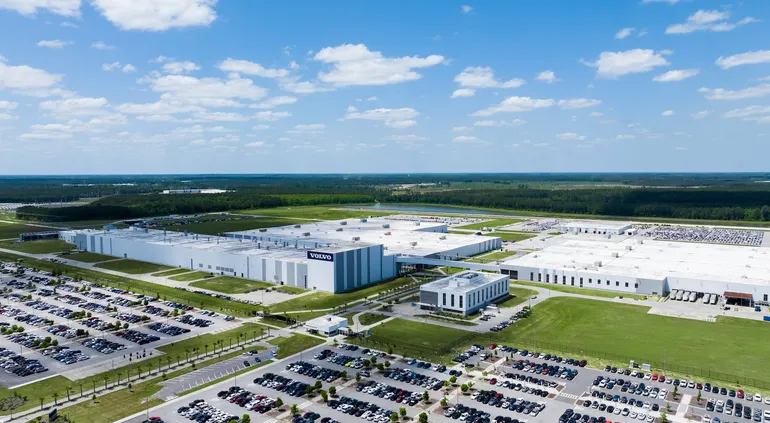Let Automotive Dive’s free newsletter keep you informed, straight from your inbox.
The factory is the automaker’s only manufacturing facility in the U.S. and will produce the XC60 mid-size SUV for the North American market.
The automaker has invested $1.3 billion in its South Carolina factory since 2015, and said it will continue to invest in the plant to bring the 2.3 million square foot facility into operational capacity. The plant’s current capacity is 150,000 vehicles a year.
Volvo said it sold over 27,000 XC60s in the U.S. in the first eight months of this year, a nearly 20% jump from the same period in 2024, so demand for the mid-size SUV remains strong.
Currently, the plant in Ridgeville, South Carolina, assembles two models, the fully electric EX90 SUV and Polestar 3. Previously, the plant built the S60 sedan, but it was discontinued last year amid sluggish sales. Volvo sold 903 S60s in the U.S. this year through the end of August, a 92% decline from the same period last year.
Volvo’s plan to build more vehicles in the U.S. is in line with the company’s strategic initiative to ensure that each region has the products it needs to meet customer demands, according to the release. It includes a more focused approach in terms of product, technology, manufacturing and commercial to better meet the needs of its customers.
“Our investment plans once again reinforce our long-term commitment to the U.S. market and our manufacturing operations in South Carolina,” said Håkan Samuelsson, Volvo Cars’ CEO, in a statement.
Samuelsson previously served as CEO of the company from 2012 to 2022. In March, Volvo Cars announced he was returning to his former role as CEO and president for a two-year term effective April 1. His return will help the automaker navigate “fast-moving technological shifts” and “growing geopolitical complexity,” the company said at the time.
While company executives didn’t disclose details on Volvo’s next-generation hybrid model, Samuelsson hinted that it’s likely to be some type of full-size, hybrid SUV, a segment that’s popular with U.S. consumers.
“This is a bigger size car for primarily for America,” Samuelsson said during a media roundtable with company executives at its South Carolina factory on Sept. 23. “It should [have] room for big families and the luggage and everything they bring, so you could imagine what type of car.”
Samuelsson also said Volvo’s new hybrid vehicles will serve as a “bridge” towards its goal of producing only EVs sometime after 2030, which is later than its initial target of ending ICE vehicle production by 2030. The plans were revised due to slower-than-expected EV adoption, which also led to other automakers revising their short to mid-term electrification goals to meet growing consumer demand for hybrid models.
“If you look at the strategy of our company, we believe we will come out stronger as an electric company after this transformation,” Samuelsson said. “It will take longer than we thought five years ago, and that’s why we need to be pragmatic and have this type of plug-in [hybrid] or bridge solution.”
Following the launch of the new next-generation hybrid model for the U.S., Volvo plans to launch additional hybrid vehicles until EV adoption becomes more widespread and demand increases.
“It’s not just in one [hybrid vehicle] generation,” Samuelsson said. “We need the second generation to bridge also.”
Ramping up vehicle production in the U.S. will also help Volvo Cars mitigate the impact of tariffs, which the Trump administration had previously set at 25% on imported vehicles from the European Union.
However, the levies decreased to 15% on Sept. 5 as part of an agreement reached between the U.S. and the EU, according to a Federal Register notice from the Department of Commerce. The reduced levies became effective Sept. 5 and were later made retroactive to Aug. 1.
In addition to its plans to build more vehicles in the U.S., Volvo commemorated its 70th year in the U.S. market during a factory event this week, which South Carolina Gov. Henry McMaster attended. The automaker has sold over 5 million vehicles in the U.S. since it first started manufacturing vehicles in the country.
“Volvo Cars’ decision to further invest in Ridgeville reinforces South Carolina’s position as a national leader in automotive manufacturing,” Gov. McMaster said in a statement. “We’re proud to continue our partnership with Volvo Cars and look forward to the company’s ongoing success in South Carolina.”
Get the free daily newsletter read by industry experts
The move follows Tesla’s decision to open its Superchargers to other automakers to improve public access and promote EV adoption.
John Locher/AP
BMW Group joined the list of automakers donating or offering support to relief efforts.
Subscribe to Automotive Dive for top news, trends & analysis
Get the free daily newsletter read by industry experts
The move follows Tesla’s decision to open its Superchargers to other automakers to improve public access and promote EV adoption.
John Locher/AP
BMW Group joined the list of automakers donating or offering support to relief efforts.
The free newsletter covering the top industry headlines











